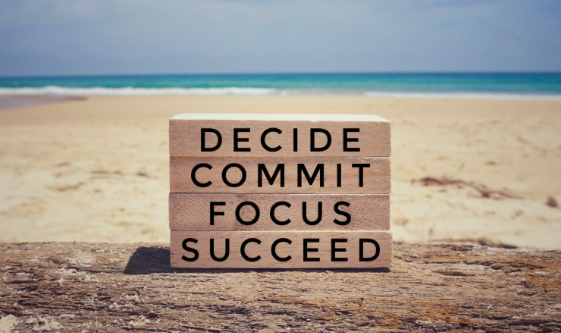In my previous blog post, I talked about the importance of stickability, which is the ability to persevere. I talked about honing your skills of stickability so you are able to commit and be “all in” when it comes to what’s truly important in your life.
Stickability requires focus, of course, but it also requires faith in your abilities and in the worthiness of your ultimate goals. Then there’s the commitment.
I’d like to share a few thoughts I had after listening to a podcast on “The Nature of Total Commitment” by my friend and fellow coach Michael Tate. You can listen to the entire 10-minute podcast yourself here: Nature of Total Commitment
Mike interviewed Dr. Emmett Cooper, the creator of the HoneyWord Bible and the Honeyword Learning Method, which is a visual recognition system that engages both sides of the brain to ingrain concepts that last a lifetime. In their conversation, Dr. Cooper shared something someone once told him—something that has stayed with him and guided his actions over the years. It’s about the stages that people go through before they commit to something significant.
He says, first they lie to themselves to make themselves feel better; there’s a lot of equivocating; it’s all talk and not a whole lot of action. Second, as the price goes up on what they want to achieve, they either quit or move forward. Third, they finally move into full commitment where they say, “I’m going to do this no matter what. I’m going to be totally committed … I’m going to make it happen no matter how long it takes or what I have to do to achieve it.”
Notice he says, “full” and “total” commitment. That’s all in. That’s a whole other level of stickability.
Dr. Cooper goes on to say: “Once you reach the total commitment moment inside your heart, it’s only then—and after you get killed a million times—after you make the total commitment that you really see that you’ve got the internal fortitude to stay the course and pay the price and push through and overcome every obstacle.
“That has stood by me,” he adds, “my entire vocational career … including my marriage and family, actually.”
He didn’t say this was easy. Quite the opposite, in fact. And it doesn’t happen every time. Dr. Cooper says only 1 to 2 percent of people actually reach this level of commitment.
That’s because circumstances will reveal that you really don’t believe in what you’re trying to do, he says. Most people are not truly in a job they love, “so it takes a fight to articulate what you’re going to commit to and stick with. You’ve gotta really love what you’re doing.”
And that comes back to what I said at the beginning of this post: Commitment and stickability require faith in your abilities and in the merit of your ultimate goals. You have to believe in yourself and in what you’re trying to accomplish.
In the last post, I shared a few of the mantras that I rely upon to help me stay committed to my goal of helping you do what you do better. These guide my own actions, and I share them with people in my programs to encourage them to figure out what’s truly important and then to maintain their commitment to achieving the worthwhile goals they’ve set.
Mantras like this one help me stay the course: Self-discipline is the will to do the unpleasant, difficult, painful, exhausting, dreadful and uncomfortable tasks.
Because that’s sometimes what it takes to achieve something truly significant.
